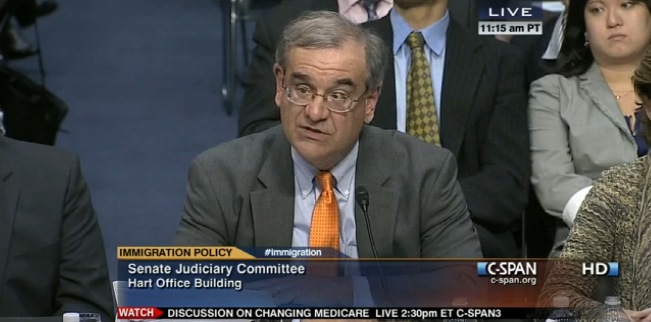 With an immigration reform bill beginning to move through the Senate, one would expect a little originality from the nativists trying to stop it. After all, if “enforcement first” and “self-deportation” haven’t worked yet, perhaps it’s time to try something new. And yet the same dusty old arguments were on display among the nativists who testified at the Senate Judiciary Committee’s April 22 hearing on the Senate immigration reform bill: S.744, “The Border Security, Economic Opportunity, and Immigration Modernization Act.” It was as if they had put their fingers in their collective ears and refused to listen to what was going on around them.
With an immigration reform bill beginning to move through the Senate, one would expect a little originality from the nativists trying to stop it. After all, if “enforcement first” and “self-deportation” haven’t worked yet, perhaps it’s time to try something new. And yet the same dusty old arguments were on display among the nativists who testified at the Senate Judiciary Committee’s April 22 hearing on the Senate immigration reform bill: S.744, “The Border Security, Economic Opportunity, and Immigration Modernization Act.” It was as if they had put their fingers in their collective ears and refused to listen to what was going on around them.
A case in point was Kansas Secretary of State Kris Kobach, whose resume includes helping to write and defend anti-immigrant laws in Arizona; Hazleton, Pennsylvania; Valley Park, Missouri; Farmers Branch, Texas; and Fremont, Nebraska—as well as being the architect of the infamous NSEERS program while serving in the Justice Department under Attorney General John Ashcroft. In his testimony, Kobach unleashed a stream of exaggerations, distortions, and outright fabrications in his attempt to cast doubt upon the bill. For instance, he claimed with a straight face that any terrorist could gain “amnesty” simply by using a false name when registering with U.S. authorities. What Kobach overlooks is that background checks rely upon fingerprints and not simply names. That’s how people with multiple aliases are caught. Just as telling as Kobach’s testimony were his responses when questioned by senators on the Judiciary Committee. He passionately defended the discredited notion of “self-deportation” and even called, once again, for an end to birthright citizenship. In short, Kobach came across as a relic from a different century.
There was also a distinct “been there, done that” flavor to the testimony of Mark Krikorian, Executive Director of the Center for Immigration Studies (CIS). Krikorian’s main theme was “enforcement first.” Put an absolute stop to unauthorized immigration via enforcement at the border and the interior of the country, then consider maybe granting a pathway to legal status for some of the unauthorized immigrants still inside of the hermetically sealed United States. What Krikorian fails to recognize is that creating a legalization program and flexible channels for future immigration is a means of enhancing security. When you take unauthorized migration for purposes of employment or family reunification out of the equation, enforcement resources can be focused on real security threats. Regardless, Krikorian revealed his disdain for legalizing any unauthorized immigrant at the very end of his testimony. He suggested that “amnesty might best be conducted piecemeal, rather than addressing millions of people effectively all at once. That is to say, candidates might be considered as they are apprehended for traffic stops or factory raids or what have you, with those who fail to qualify be removed.” This may have been Krikorian’s attempt at humor, but no one was laughing.
Playing the straight man to Krikorian’s comic vitriol was Steven Camarota, Director of Research at CIS. Camarota delivered what seemed, on the surface, to be a sincere and straightforward presentation on the economics of immigration. His basic point was that less-educated workers, immigrant and native-born alike, are fiscal drains on the nation. But since natives have a birth right to be here and immigrants don’t, we have a right to keep out the less-educated immigrants. He discounted the findings of numerous economists that the broader economic contributions of immigrants at all levels of education and skill are a net benefit to the native-born population, and that legalizing the unauthorized population would be in the economic best interests of everyone. But his cursory refutation was not very convincing when stacked up against that weight of the opposing evidence. More importantly, Camarota offers no guide for what to do now that 11 million unauthorized men, women, and children are already here. Do we allow them to acquire legal status and thereby increase their economic contributions to the nation, or do we spend countless billions trying to deport them (or making life so miserable that they choose to “self-deport”)?
As this hearing illustrated, the nativist movement may not be out of gas yet, but it’s running on fumes when it comes to ideas.
Photo Courtesy of C-Span.
FILED UNDER: center for immigration studies, Immigration Raids, Kris Kobach, Mark Krikorian, Nativists, Restrictionists, Rhetoric, Steven Camarota


